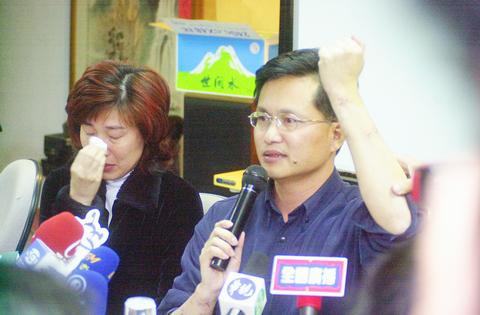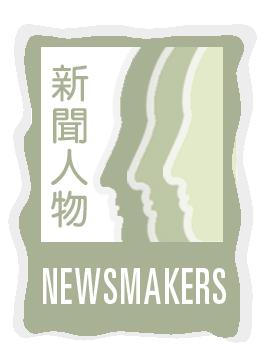The ongoing probe into the alleged abduction of KMT lawmaker Huang Hsien-chou (黃顯洲) has cast a shadow on his squeaky-clean image.
Described by colleagues as cautious, gentle and low key, Huang, 43, jolted the nation on Jan. 2 when he revealed during a news conference that he had been kidnapped by underworld figures between Dec. 27 and Dec. 31.

TAIPEI TIMES FILE PHOTO
He rolled up his sleeves to show what he claimed were wounds inflicted by his kidnappers in a hotel room at the Grand Hyatt Taipei, where he says he was drugged, tied up, held at gun point and robbed of NT$800,000 in cash.

The departing lawmaker linked the mishap to his attempt to mediate a financial dispute on behalf of a constituent. But investigators have called Huang's testimony into question, noting that a hotel room is a peculiar locus for extending such assistance.
KMT legislator Apollo Chen (陳學聖), who belongs to the party's Reformist faction, of which Huang is also a member, painted his colleague as a serious, compassionate person who has no appetite for the limelight.
"While most lawmakers vie for a spot on finance or other popular committees," Chen said, "Huang immersed himself in the study of science and technology bills. He also shows deep concern for the underprivileged and has been actively involved in charity activities."
Chen says he was shocked by the incident's sensational twists.
On Jan. 3, Chan Hui-hua (
Even more bizarre, Chan's handicapped brother, Chan Fu-shun (詹富順), told the press the next day Huang had lied about what transpired during his "captivity." He insisted Huang had a wild sex party in the hotel room where the lawmaker smoked marijuana, used the drug ecstasy and engaged in sadomasochistic games with his sister and two other women.
Forensic tests are being conducted on all parties involved for traces of drug use, as Huang's aides try to cast doubt on any potentially positive test results.
"The lawmaker had been in treatment for spinal pain before the Dec. 1 elections and the medicine he took may affect the test's outcome," said Huang's secretary Liu Ming-hui (劉明暉). "While held hostage, he could have used illicit drugs under duress."
Huang has since shunned the media.
After earning his master's degree from the Illinois Institute of Technology in 1985, Hwang worked in turn as a college lecturer, engineer, advisor for the former provincial government and member of the National Assembly. In 1998, he won a seat representing his home city of Taichung in the legislature. In the last three years, he took a seat on the Sci-tech and Information Committee and played a role in passing legislation on electronic signatures, the regulation of the telecommunications industry and the management of science-based parks.
Partly due to his work, the legislature passed a law that encourages the private sector to take part in public construction projects.
In addition, Huang has pushed for the establishment of a national construction department. The DPP administration is receptive to the plan as it fits in with its bid to remake government.
KMT legislator Lin Kuo-lung (
"I cannot imagine him doing anything this nonsensical," Lin said. "He was always very attentive and conscientious when reviewing bills."
Like many others, Lin shied away from passing judgment, saying he didn't know Huang that well and citing the fact that the case was still under investigation.
Huang, who failed to win a second term, is due to vacate his office at the end of this month. On the campaign trail, he portrayed himself as a family man who considered nothing more important than putting food on the table and vowed, if re-elected, to help his constituents meet their needs.
Whatever the truth, it's no secret that many politicians in Taiwan are fond of having extravagant nightlives. Parties who bitterly bicker over policy issues in the daytime are frequently reconciled at night in company of gorgeous hostesses while eating delicious food.
Earlier, DPP lawmaker Hsu Jung-shu (
"You bet, there are many womanizers in the DPP," Hsu said. "And some have broken families as a result of their promiscuity."
People First Party legislator Chou Hsi-wei (
"Rumors that some colleagues lead a loose life are nothing new," he said, declining to name any except adding that "birds of a feather flock together."
Commenting along similar lines, KMT lawmaker Chen Ching-pao (
"As a microcosm of society, the legislature has its share of hypocrites," Chen said. "I'm glad I'll be leaving this place soon."

Right-wing political scientist Laura Fernandez on Sunday won Costa Rica’s presidential election by a landslide, after promising to crack down on rising violence linked to the cocaine trade. Fernandez’s nearest rival, economist Alvaro Ramos, conceded defeat as results showed the ruling party far exceeding the threshold of 40 percent needed to avoid a runoff. With 94 percent of polling stations counted, the political heir of outgoing Costa Rican President Rodrigo Chaves had captured 48.3 percent of the vote compared with Ramos’ 33.4 percent, the Supreme Electoral Tribunal said. As soon as the first results were announced, members of Fernandez’s Sovereign People’s Party

MORE RESPONSIBILITY: Draftees would be expected to fight alongside professional soldiers, likely requiring the transformation of some training brigades into combat units The armed forces are to start incorporating new conscripts into combined arms brigades this year to enhance combat readiness, the Executive Yuan’s latest policy report said. The new policy would affect Taiwanese men entering the military for their compulsory service, which was extended to one year under reforms by then-president Tsai Ing-wen (蔡英文) in 2022. The conscripts would be trained to operate machine guns, uncrewed aerial vehicles, anti-tank guided missile launchers and Stinger air defense systems, the report said, adding that the basic training would be lengthened to eight weeks. After basic training, conscripts would be sorted into infantry battalions that would take

GROWING AMBITIONS: The scale and tempo of the operations show that the Strait has become the core theater for China to expand its security interests, the report said Chinese military aircraft incursions around Taiwan have surged nearly 15-fold over the past five years, according to a report released yesterday by the Democratic Progressive Party’s (DPP) Department of China Affairs. Sorties in the Taiwan Strait were previously irregular, totaling 380 in 2020, but have since evolved into routine operations, the report showed. “This demonstrates that the Taiwan Strait has become both the starting point and testing ground for Beijing’s expansionist ambitions,” it said. Driven by military expansionism, China is systematically pursuing actions aimed at altering the regional “status quo,” the department said, adding that Taiwan represents the most critical link in China’s

‘REALLY PROUD’: Nvidia would not be possible without Taiwan, Huang said, adding that TSMC would be increasing its capacity by 100 percent Nvidia Corp CEO Jensen Huang (黃仁勳) on Saturday praised and lightly cajoled his major Taiwanese suppliers to produce more to help power strong demand for artificial intelligence (AI), capping a visit to the country of his birth, where he has been mobbed by adoring fans at every step. Speaking at an impromptu press conference in the rain outside a Taipei restaurant, where he had hosted suppliers for a “trillion-dollar dinner,” named after the market capitalization of those firms attending, Huang said this would be another good year for business. “TSMC needs to work very hard this year because I need a lot